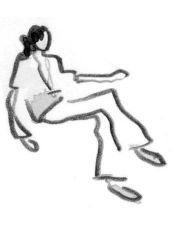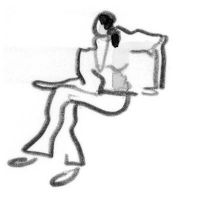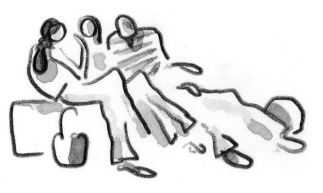Ridiculous/Hilarious/Terrible/Cool (3 page)
Read Ridiculous/Hilarious/Terrible/Cool Online
Authors: Elisha Cooper

Boys do the serious back-pounding version, girls do the delicate lean with one foot raised backward. Boy-on-girl is a side-to-side rocking (the length of which is being exploited by certain boys). But hugs are an opportunity to reconnect with old friends, and size up new ones.
“You're back!”
“I
am!
”
am!
”

Hallways also become fashion runways. One girl strides down the halls wearing a red T-shirt with a print of a phoenix. Next comes a girl wearing cargo pants so splayed her sneakers are hidden. Then comes a student in a tight T-shirt whose contours make it difficult to read
Everyone Loves an Italian Girl
. With each shirt, the boys standing next to the lockers pretend not to notice how the shirt treats the wearer's breasts.
Everyone Loves an Italian Girl
. With each shirt, the boys standing next to the lockers pretend not to notice how the shirt treats the wearer's breasts.
Boys' shirts don't highlight breasts. The boys saunter down the hallways in frayed T-shirts from Abercrombie & Fitch, or T-shirts embellished with slogans: GEORGE BUSH DOESN'T CARE ABOUT BLACK PEOPLE; appetite for destruction;
War is Costly. Peace is Priceless
.
War is Costly. Peace is Priceless
.
Finally, shoes. Stripy Adidas, retro Pumas, bright white Dwyane Wade Converse high-tops, Hush Puppies, Uggs, sandals with flowery straps, clogs. Everything you need to know about a student can be told by what is on her feet. A student is her shoes; her shoes are her.
Aisha Kamillah Shaikh sits alone in the library with her Pumas off, right foot tucked underneath her. She has eyes the color of espresso, a petite nose, and coiled dark hair that cascades over her neck and the two necklaces she's wearing: one reads
Allah
in Arabic, the other has a prayer for family and protection.
Allah
in Arabic, the other has a prayer for family and protection.

Aisha is the only transfer in Payton's senior class. She doesn't know anyone here. Her family moved to Chicago last month. Both her parents are engineers and their work moves the family around the world. Last year they were in Florida, the three years before that they lived in Cairo. The Shaikhs have moved so often that Aisha's father gave each of the children an easily packable box called
The Important Box
in which to keep their favorite possessions. Aisha's
Important Box
has always been filled with toys.
The Important Box
in which to keep their favorite possessions. Aisha's
Important Box
has always been filled with toys.
Payton is the first school Aisha has attended where not one girl wears a
hijab
. She doesn't wear one either. Her father is Pakistani. Her mother is Colombian. She has one older brother, two younger sisters. The youngest sister drinks coffee, like her mother. Aisha drinks tea, like her father. The middle sister drinks Vitaminwater and no one in the family can figure out what is up with that.
hijab
. She doesn't wear one either. Her father is Pakistani. Her mother is Colombian. She has one older brother, two younger sisters. The youngest sister drinks coffee, like her mother. Aisha drinks tea, like her father. The middle sister drinks Vitaminwater and no one in the family can figure out what is up with that.
When Aisha mentions this, she laughs. Her laugh is biting and sharp. She says she inherited her father's sense of humor along with his preference for tea. Her mother, Aisha says, is not funny
at all
. She never got a sense of humor because she left Colombia before she could get one in Spanish, and came to America after she could get one in English, leaving her appreciation for laughter drifting in the stratosphere somewhere above Mexico.
at all
. She never got a sense of humor because she left Colombia before she could get one in Spanish, and came to America after she could get one in English, leaving her appreciation for laughter drifting in the stratosphere somewhere above Mexico.

Aisha chuckles, switches her foot from one side to the other, and looks around the library. Bookshelves line three of the library walls, windows fill the other. In the center of the room, students hunch at wood tables over textbooks, or inside carrels staring at computer screens.
Aisha is used to being an outsider. She's used to being alone, used to starting over. She's done this before, she'll do it again. She's just passing through. It's only a year, after all.
Aisha doesn't think she will meet anybody at Payton. With a resigned shrug she says, “There's no incentive to make friends.”
On a dirt field a block away from Payton, the J.V. football team is playing its first game of the year and getting demolished. The team they're playing is enormous. They're treating the Grizzlies like cubs. For a high school named after a football player whose nickname was “Sweetness,” the Payton J.V. is anything but. Their nickname could be “Sourness,” or “Pummeledintothedirtness.”
The spectators on the sidelines suffer with the players, wincing with each hit:
“Ouch.” “Ooof.”
“Oh,
boy
.” When the other team's running back rumbles seventy yards for a touchdown, leaving a crumpled trail of Payton players in his wake, a woman on the sideline says, “It's all right, they'll learn.”
“Ouch.” “Ooof.”
“Oh,
boy
.” When the other team's running back rumbles seventy yards for a touchdown, leaving a crumpled trail of Payton players in his wake, a woman on the sideline says, “It's all right, they'll learn.”

The man next to her says, “Yeah, they'll learn how to get run over.”
The only ones who seem to be enjoying themselves are members of the Payton varsity, taking a break from their practice. They're standing behind the J.V. and giving advice: “Wrap up!” “Hit!” “Run!” The act of giving advice is proof that they have
arrived,
and this is something to be savored, sweetness itself.
arrived,
and this is something to be savored, sweetness itself.
The excitement of the first weeks of school has ebbed, and weariness seeps in. Yawning becomes viral. A boy yawns in class, then infects the girl next to him, who infects the boy next to her, and so on. The yawn continues until it hits an obstacle (a student whose eyes are closed, an empty seat, the teacher), and ricochets back the way it came, back to the boy who started it. The yawn resembles a wave making its way around a stadium.

Struggling out of his class today is Zef Calaveras. Blond bangs hang over Zef's sleepy eyes. A black T-shirt with a skull-and-crossbones hangs on his chest. His skin is the color of flour. Rubber bands wrap around his wrists, headphones around his neck, an iPod from his belt. As he takes a seat on a bench under the stairs in the
 atrium, he sort of rattles. Zef's a junior, though already one with a reputation, at least according to Zef. As he slouches into the bench, he mumbles, “Everyone at this school knows I'm a bit odd.”
atrium, he sort of rattles. Zef's a junior, though already one with a reputation, at least according to Zef. As he slouches into the bench, he mumbles, “Everyone at this school knows I'm a bit odd.”

Despite Zef's self-described oddness, he is the object of attention. He's a boy who, just by sitting there, other students approach (it doesn't hurt that he is pale and good-looking in a '70s punk rocker sort of way). In fact, he's always getting interrupted. Other kids like saying hello to Zef. Zef doesn't mind saying hello back. When he waves, he uses his entire arm, as if he's lovingly waxing the hood of a vintage car.
“What up,
Sumner!
”
Sumner!
”
“
Hey,
Josh Lipinski!”
Hey,
Josh Lipinski!”
Over the summer Zef was in a band called Big Roy and the Radio Flyers. But Big Roy started playing “crappy pop punk,” so Zef quit. Now he plays by himself late at night. His room is “kinda messy.” There's clutter on every surface, posters all over the walls: a transit map he took from a Chicago subway car, a periodic table of the elements, a poster with a giant pistachio nut that some girl gave to him. His window looks out at a brick wall.
Zef stays in his room, playing on his computer and listening to bands like The Strokes or The Killers until early morning. Consequently, the sleepy eyes. His late nights have made for late mornings and a bunch of tardies. He's been dozing during his classes.
“Sumner, what is
up!
”
up!
”
What is up is music, because Zef is at his most awake during the early-morning jam sessions where he can arrange everything on his computer: drums, base, vocals. Zef is his own band.
“It's
ridiculous
. I've got myself on my iPod,” he says, patting his belt. If someone wants to listen to him as they walk past, they can.
ridiculous
. I've got myself on my iPod,” he says, patting his belt. If someone wants to listen to him as they walk past, they can.
There are no boundaries on the floor of the atrium, but that doesn't mean they do not exist. The cool white students sit on the benches outside the boys' bathroom. The boys in this group wear trucker hats (taken off quick when security approaches), bent so vertically the lids look like the top half of exaggeratingly pouty lips. The girls have bodies in whose exhibition they are not unconfident.


Other books
All That I Desire by Francis Ray
A Shroud for Jesso by Peter Rabe
Fallen for You by Carlie Sexton
Locked Together (In Chains) by Abbott, Michelle
Lucky Bear - Wild Bear 01 by Ruby Shae
Nowhere to Hide by Saxon Andrew
The Butcher of St Peter's: (Knights Templar 19) by Michael Jecks
Georgie and Her Dragon by Sahara Kelly
Three-Ring Terror by Franklin W. Dixon
Aven's Dream by Alessa James